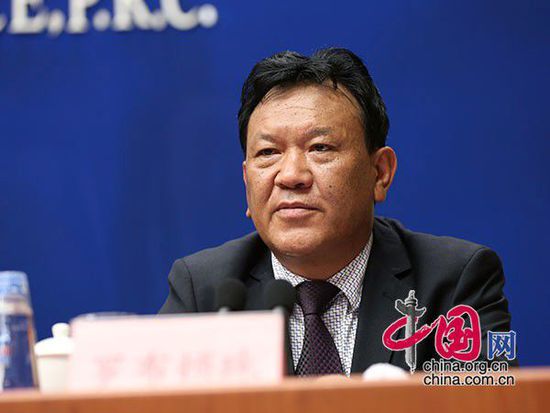 |
|
Norbu Dondup from the United Front Work Department of the Communist Party of China (CPC) Tibet Autonomous Regional Committee, speaks at a press conference held in Beijing on September 6, 2015. [Photo/ China.org.cn] |
BEIJING - A Chinese official on Sunday defended the role of the government in the Tibetan Buddhism system of reincarnation, saying whatever the Dalai Lama says or does can't change the central government's right to confirm the new incarnation.
Norbu Dondup from the United Front Work Department of the Communist Party of China (CPC) Tibet Autonomous Regional Committee, made the remarks at a press conference in which a white paper on Tibet was released. The press conference was held ahead of the 50th anniversary of the foundation of the ethnic autonomous region.
Norbu Dondup said the government attaches great importance to the reincarnation system, which since the Qing Dynasty has been affirmed and regulated by the central government.
The current regulation on the reincarnation system is clearly outlined in a document issued by the State Administration for Religious Affairs in 2007, he added.
"So, no matter what the Dalai Lama says or does, he can't deny the central government's right to confirm the new incarnation," said the official.
The official was responding to an interview by the New York Times with the 14th Dalai Lama, who said "the CPC is pretending that they know more about the reincarnation system than Dalai Lama."
Norbu Dondup also accused the Dalai Lama of violating historical conventions and religious rituals by designating a Panchen Lama at will. "The designation is illegal and invalid," he said. The regulation states that a Panchen Lama needs to be confirmed by the central government.
"Currently, this so-called 'soul boy' designated by Dalai Lama is receiving education, living normally and growing healthily. He does not want to be disturbed by anyone," he said.
Titled "Successful Practice of Regional Ethnic Autonomy in Tibet," the white paper said since the democratic reform of 1959 and regional ethnic autonomy came into practice in 1965, Tibet has followed the new socialist system and achieved historic leaps and bounds in its economic and social development.
